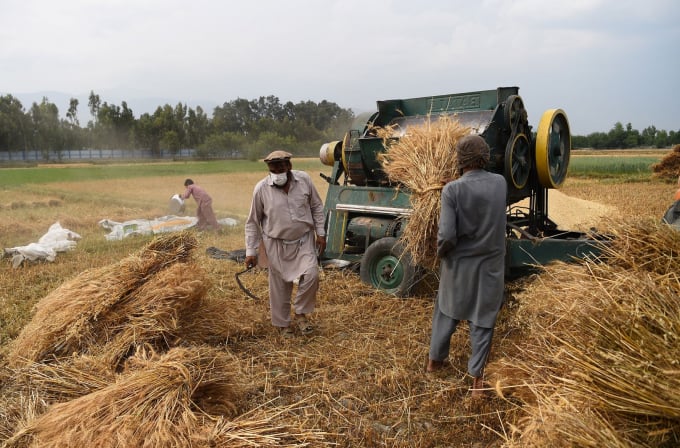November 28, 2025 | 01:00 GMT +7
November 28, 2025 | 01:00 GMT +7
Hotline: 0913.378.918
November 28, 2025 | 01:00 GMT +7
Hotline: 0913.378.918

Afghan farmers throw wheat bunches in a thrashing machine. Photo:Farshad Usyan/FAO
Building the resilience of vulnerable rural populations in fragile contexts such as conflicts, health crises and natural disasters through agrifood systems transformation must remain a key priority, QU Dongyu, Director-General of the Food and Agriculture Organization of the United Nations (FAO), said at the European Humanitarian Forum in Brussels on Monday.
He participated in a session entitled “Failure is not an option: the imperative of nexus to fight famine” focused on the need for an effective nexus approach to famine and food insecurity, drawing on concrete cases and best practices.
Other speakers included Meryame Kitir, Belgian Minister for Development Cooperation; Karin Hulshof, UNICEF Deputy Executive Director; Sofía Sprechmann, Secretary General of CARE International; and Axel van Trotsenburg, World Bank Managing Director Operations.
Preliminary estimates set out in the latest edition of the FAO Global Report on Food Crises, to be released next month, indicate that in 2021 there was a further significant increase in the number of people experiencing acute food insecurity.
“Recent trends of both chronic and acute food insecurity are alarming,” Qu said calling for stronger action, political commitment, and new approaches by the international community to address the fragility of the global agrifood systems and foster rural development.
Ending the cycle of destabilization, fragility and conflicts
Speaking about the complexity of the global situation due to the ongoing impacts of the COVID-19 pandemic, natural disasters and conflicts in Africa, Near East and now in Ukraine, Qu highlighted the need to transform agrifood systems to make them more efficient, more inclusive, more resilient and more sustainable as a key part of the solution.
Equally important is to meet the urgent needs of farmers in these fragile contexts including providing them with vital agricultural inputs including seeds, fertilizers and agricultural tools to enable them to provide for themselves and their families.
The Director-General reiterated FAO’s commitment to play a decisive role based on its mandate in such areas as policy making, capacity building and technical assistance, agrifood systems transformation and development of rural areas as well as information sharing. Through the innovation, digitalization and global networks we can extend our collaboration with the World Food Programme and other United Nations agencies to minimize risks and help vulnerable people in the best possible way, he added.
The Director-General emphasized that a coordinated approach was key to implementing the humanitarian-development-peace nexus at all levels.
Noting that conflicts have different root causes including fight for land, water and other natural resources, the Director-General stressed the importance of developing and implementing policies to regulate access to and promote the rational use of natural resources.
FAO is willing to offer various policy consultations to contribute to peace building, he concluded.
The European Humanitarian Forum is organised by the European Commission and France in the framework of its Presidency of the Council of the European Union. It gathers policy makers, humanitarian partners and other stakeholders, for a more sustained dialogue on humanitarian policy and strategy.
(FAO.org)

(VAN) A new study reveals how the simultaneous effects of ocean acidification, salinity and loss of oxygen are making the world more fragile.

(VAN) Hopes are growing that the creation of the first 3D turkey gut model could be a turning point in the battle against the virulent blackhead disease.

(VAN) Tyson, America’s biggest meat supplier, plans to shutter one of its largest beef processing plants as the industry continues to struggle with low cattle supplies and political pressure from Washington.

(VAN) New FAO study shows how digital solutions are empowering farmers and fishers to prevent losses and build resilient agrifood systems.

(VAN) Brazil's COP30 presidency pushed through a compromise climate deal on Saturday that would boost finance for poor nations coping with global warming but that omitted any mention of the fossil fuels driving it.

(VAN) Poultry farmers in the UK have been warned that they could face one of the worst winters yet for bird flu.

(VAN) Prices of main-crop paddy have risen sharply, with jasmine rice hitting 16,100 baht per tonne — the highest level in years.